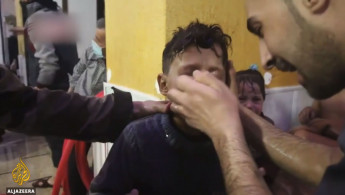Russian TV 'coerced' Syrian boy into denying chemical attack
The presence of uniformed men in Russia 24's video report suggest interviewees could have been coerced into denying the Douma chemical attack took place.
2 min read
Hassan Diab receives medical treatment after chemical weapons attack [YouTube screenshot]
A Russian media report attempting to cast doubt over the April 7 Douma chemical attack by interviewing one of the victims was filmed at an army base, an investigation has found, raising questions about whether the boy was coerced.
The Russian report, which appeared on state-owned Russia 24, alleges that 11-year-old Hassan Diab was living proof that Western states were "lying" about the attack to justify launching missile strikes against Syrian regime targets on April 13.
Diab was seen in a widely circulated Al Jazeera report that showed him doused in water and being medically treated following the Douma chemical attack.
Russia considers the Russia 24 report, which features Diab and his father, as well as claims the White Helmets forced him to act in the Al Jazeera video, crucial to its case that the Douma chemical attack was staged.
Russian officials are planning to screen the video for the UN Security Council.
The Russian report, which appeared on state-owned Russia 24, alleges that 11-year-old Hassan Diab was living proof that Western states were "lying" about the attack to justify launching missile strikes against Syrian regime targets on April 13.
Diab was seen in a widely circulated Al Jazeera report that showed him doused in water and being medically treated following the Douma chemical attack.
Russia considers the Russia 24 report, which features Diab and his father, as well as claims the White Helmets forced him to act in the Al Jazeera video, crucial to its case that the Douma chemical attack was staged.
Russian officials are planning to screen the video for the UN Security Council.
Russia 24 correspondent Evgeny Poddubnyy anchored the report and it was circulated widely by Moscow's diplomats and Russia Today. English-speaking media also picked up on the report.
Poddubnyy told The Intercept that he could "guarantee that the interview was recorded without pressure on the child's father and the boy himself".
Twitter Post
|
Assad-ally Russia has called the suspected chemical weapon attack that left at least 49 dead a "provocation" and "fake news".
The Syrian regime has also repeatedly denied using chemical weapons in the now-seven-year war. However, the UN-OPCW Joint Investigative Mechanism, which was established to assign culpability for chemical attacks in Syria, previously found the regime responsible for the April 2017 Khan Sheikhoun and other attacks.
In addition, a recent Human Rights Watch report found the Syrian regime responsible for the majority of 85 documented chemical weapons attacks between 2013 and 2018.
On Saturday, OPCW inspectors took samples from Douma, but Western officials have said the site could have been "tampered" with. The chemical watchdog group could only access the area two weeks after the attack to inspect the site.
Agencies contributed to this report.
Follow us on Twitter: @The_NewArab





 Follow the Middle East's top stories in English at The New Arab on Google News
Follow the Middle East's top stories in English at The New Arab on Google News


![22 Arab countries at COP29 have rejected the targeting of fossil fuels [Getty]](/sites/default/files/styles/image_330x185/public/2024-11/GettyImages-2184289638.jpg?h=199d8c1f&itok=ptHl5bec)